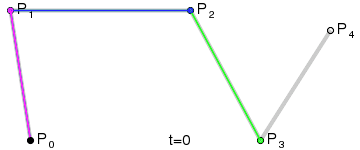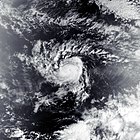Wikipedia:Main Page history/2022 December 2b
From today's featured article
Tropical Storm Zelda was the last tropical cyclone of the 1991 Pacific typhoon season. The area of low pressure that became Zelda formed near the International Date Line, and became a tropical depression on November 27, 1991. The Joint Typhoon Warning Center (JTWC) reported that it had reached tropical storm intensity near the Marshall Islands on November 28. According to the JTWC, the storm strengthened to 65 knots (120 km/h; 75 mph), equivalent to a Category 1 on the Saffir–Simpson hurricane wind scale, on November 29, and reached a peak of 80 kn (150 km/h; 90 mph). According to the Japan Meteorological Agency, it had a barometric pressure of 975 hectopascals (28.8 inHg). Zelda weakened into a tropical storm on December 2, and then a tropical depression two days later. It caused significant damage in the Marshall Islands, but no deaths or injuries were reported. Later in December, U.S. president George H. W. Bush declared the storm to be a major disaster, allowing the FEMA to assist. (Full article...)
Did you know ...
- ... that Latter-day Saint diarist Ida Hunt Udall (pictured) turned down a marriage offer from her longtime boyfriend because he was a monogamist, and she wanted a polygamous marriage?
- ... that the Xinxiu bencao was the first state-sponsored pharmacopoeia in China?
- ... that before playing in the NFL, Jeff Jordan was a Rhodes Scholarship finalist?
- ... that the Japanese fire-bellied newt tends to show its belly to birds but wag its tail at snakes?
- ... that Edward Glemham destroyed two Spanish vessels, repulsed four galleys, and captured a rich Venetian merchant ship in his first voyage as a privateer in 1590?
- ... that anthropologist Theodora Kroeber wrote a biography of her husband that was described as a "welcome and refreshing exception" to the "often embarrassing" biographies of men written by their wives?
- ... that the Cornish poet D. M. Thomas blamed himself for the death of William Golding, the author of Lord of the Flies?
- ... that the Roosevelt Hotel had a Teddy Bear Cave?
In the news
- Jiang Zemin (pictured), former general secretary of the Chinese Communist Party, dies at the age of 96.
- A deadly fire in Ürümqi escalates ongoing protests across China in response to the government's zero-COVID policy.
- Anwar Ibrahim of the Pakatan Harapan coalition becomes Prime Minister of Malaysia after the general election produces the nation's first hung parliament.
- An earthquake centred near Cianjur in Indonesia's West Java kills at least 323 people and injures more than 7,000 others.
On this day

- 1805 – War of the Third Coalition: French forces led by Napoleon decisively defeated a Russo-Austrian army commanded by Tsar Alexander I at the Battle of Austerlitz (depicted).
- 1852 – Louis-Napoléon Bonaparte established the Second French Empire, declaring himself Emperor of the French as Napoleon III.
- 1942 – Manhattan Project scientists led by Enrico Fermi initiated the first self-sustaining chain reaction in the experimental nuclear reactor Chicago Pile-1.
- 1989 – The Malayan Communist Party and the Malaysian government signed a peace accord to end a 21-year communist insurgency.
- António Luís de Seabra, 1st Viscount of Seabra (b. 1798)
- John Barbirolli (b. 1899)
- Chaudhry Muhammad Ali (d. 1982)
From today's featured list

A series of torpedo cruisers was built between the 1870s and the 1890s by the Italian Regia Marina (Royal Navy) as part of a program intended to strengthen the fleet during a period of limited naval budgets. Six different classes, comprising eighteen torpedo cruisers, were constructed. The first vessel, Pietro Micca, was laid down in 1875, and was one of the first torpedo cruisers built by any navy. She proved to be a disappointment in service, being too slow to be an effective warship. Pietro Micca was followed by the more successful design, Tripoli, which provided the basis for the four Goito-class cruisers (example pictured) and the eight-vessel Partenope class. Most of the Italian torpedo cruisers served during the relatively uneventful 1880s, 1890s, and 1900s, and as a result, saw little activity outside of routine training operations. By the early 1900s, many of the cruisers had been reduced to subsidiary roles or had been discarded outright. A handful of vessels, specifically of the Partenope and Agordat classes, were still in front-line service by the time of the Italo-Turkish War in 1911–1912. (Full list...)
Today's featured picture

|
A Bézier curve is a parametric curve used in computer graphics and related fields. The curve, which is related to the Bernstein polynomial, is named after Pierre Bézier, who used it in the 1960s for designing curves for the bodywork of Renault cars. Other uses include the design of computer fonts and animation. Bézier curves can be combined to form a Bézier spline, or generalized to higher dimensions to form Bézier surfaces. Animation credit: Phil Tregoning
Recently featured:
|
Other areas of Wikipedia
- Community portal – The central hub for editors, with resources, links, tasks, and announcements.
- Village pump – Forum for discussions about Wikipedia itself, including policies and technical issues.
- Site news – Sources of news about Wikipedia and the broader Wikimedia movement.
- Teahouse – Ask basic questions about using or editing Wikipedia.
- Help desk – Ask questions about using or editing Wikipedia.
- Reference desk – Ask research questions about encyclopedic topics.
- Content portals – A unique way to navigate the encyclopedia.
Wikipedia's sister projects
Wikipedia is written by volunteer editors and hosted by the Wikimedia Foundation, a non-profit organization that also hosts a range of other volunteer projects:
-
Commons
Free media repository -
MediaWiki
Wiki software development -
Meta-Wiki
Wikimedia project coordination -
Wikibooks
Free textbooks and manuals -
Wikidata
Free knowledge base -
Wikinews
Free-content news -
Wikiquote
Collection of quotations -
Wikisource
Free-content library -
Wikispecies
Directory of species -
Wikiversity
Free learning tools -
Wikivoyage
Free travel guide -
Wiktionary
Dictionary and thesaurus
Wikipedia languages
This Wikipedia is written in English. Many other Wikipedias are available; some of the largest are listed below.
-
1,000,000+ articles
-
250,000+ articles
-
50,000+ articles



